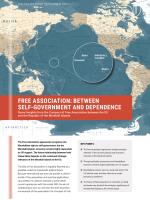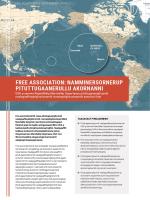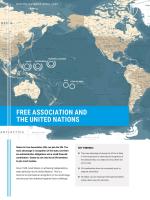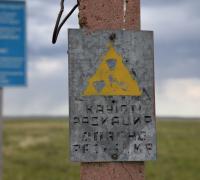Free association: between self-government and dependence ,
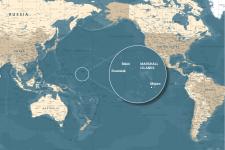
Read in Greenlandic (translation: Tukummeq Maliina Møller-Steffens)
The Free Association agreement recognizes the Marshallese right to self-government, but the Marshall Islands’ economy remains highly dependent on US support. The future relationship between both states likely depends on the continued strategic relevance of the Marshall Islands to the US.
The idea of free association is regularly flaunted as a possible model for Greenland’s political future. Because international law does not provide a uniform model of free association and practical applications vary widely, it is useful to examine in some detail current experiences with this model. With the aim of contributing to such an overview, this brief examines one example of free association: the Compact of Free Association between the United States (US) and the Republic of the Marshall Islands (RMI), a Pacific island nation with a population of approx. 60,000.
- The free association agreement merges strategic interests of the US with political and economic interests of the Marshall Islands.
- Though politically autonomous the Marshallese economy remains largely dependent on US support.
- Marshallese citizens can live, study and work in the US without visas, but they often do so under precarious conditions.
- The future of free association is uncertain as rising sea levels may diminish the strategic significance of the Marshall Islands to the United States.
The Compact of Free Association between the US and the Marshall Islands came into effect in 1986 and was amended in 2004. It merged the strategic interests of the United States with the political and economic interests of the Marshall Islands. Under the agreement, the Marshallese government has political autonomy and authority to conduct its own foreign relations, whereas the United States retains full authority and responsibility for defense and security matters in and relating to the Marshall Islands.
The two state parties are currently renegotiating the arrangement as the economic obligations of the US run out in 2023. While the interests of the US and the Marshall Islands still converge, the process has also brought to light several tensions and uncertainties. These pertain to the Marshall Islands’ economic dependence on the US, the long-term strategic relevance of the RMI to the US, the settlement of past grievances – particularly in relation to nuclear testing – and the rights of Marshallese citizens in the US
Economic Dependence
As part of the amended free association concluded between the US and the Marshall Islands, the US government agreed to the provision of economic assistance to the government of the Marshall Islands for a period of twenty years (2004-2023). In total, since 2004, the US has provided over USD 800 million in direct assistance, subsidies, and financial support to the Marshall Islands.
The main part of this financial support is grant-based and focuses on education, health, private sector development, public capacity-building, and the environment. The overall aim of this grant is to promote economic advancement and budgetary self-reliance. Support also includes an annual grant regarding the military use and operating rights of Kwajalein atoll. The U.S. Army Garrison – Kwajalein Atoll (USAG-KA) is the second largest employer in the RMI. In addition, the US contributes to a trust fund and makes available programs and services, including a postal service, weather service and aviation administration.
Although the Marshallese government decides on the allocation of grant-based funding, it shares the right to budgetary oversight with the US through a Joint Economic Management and Financial Accountability Committee. This allows the US Government to monitor and evaluate progress in meeting the objectives of the Compact of Free Association.
The Marshallese economy is highly dependent on US donor money, which makes up approximately 70 percent of the country’s total GDP. In practice, the ability for self-government and economic development, therefore, relies on the continued support of the US and the extension of program funding beyond the fiscal year 2023.
Strategic Relevance
When the US and the Marshall Islands negotiated the Compact of Free Association in the early 1980s, they were motivated by different interests. The Marshall Islands sought greater political autonomy and self-determination; the United States mainly wanted to bolster its post-World War II strategic presence in the Pacific.
The strategic relevance of the Marshall Islands to the US was officially recognized in 1947, when the UN assigned the United States administering authority over the Trust Territory of the Pacific Islands (TTPI) as a “strategic area”. The Marshall Islands was part of the TTPI and their designation as a strategic territory entitled the US to establish military bases and infrastructure, as well as to station and employ armed forces there.
Today, the Marshall Islands remains of vital strategic interest to the US. First, US authority over Marshallese defense and security supports US strategic dominance of the region and denies strategic access to other great powers, most notably China. Second, the USAG-KA includes the Ronald Reagan Ballistic Missile Defense Test Site, a central pillar of US missile defense. In 2011, the Marshall Islands and the US signed an agreement, which reaffirmed US strategic rights in the region and extended the American lease over the Reagan Test Site at Kwajalein Atoll until 2066, with an option to renew until 2086.
- Free association is a politico-juridical status that originates in a series of efforts by the United Nations to encourage the transition from non-self-governing territories to sovereign states.
- Freely associated states are sovereign political entities with the right to self-government. However, authority in the realms of foreign affairs and/or defense to various degrees remains a prerogative of the former colonial or administrating government. The Marshall Islands has full authority in foreign affairs, but the US remains responsible for matters related to security and defense.
- Only 5 states in the world have entered into free association as a path to decolonization. The Cook Islands (since 1965) and Niue (since 1974) are freely associated with New Zealand. The Federated States of Micronesia (since 1986), the Republic of the Marshall Islands (since 1986) and the Republic of Palau (since 1994) are in free association with the US.
In the future, the continued strategic relevance of The Marshall Islands to the US not only depends on geopolitical circumstances of the time but also on the effects of climate change. A 2017 Pentagon-funded study on the impact of climate change on the Kwajalein atoll predicts that in 2055-2065 a majority of the island is highly likely to experience annual floodings. Such prognoses can introduce uncertainty over the prolongation of the Compact in the medium to long term.
Nuclear Testing
The 1947 strategic trusteeship agreement allowed the US to continue its program of nuclear testing in the Marshall Islands, which it had begun in 1946. Between 1946 and 1958, the US carried out 67 nuclear tests on Bikini and Enewetak, the most northern atolls of the Marshall Islands.
A considerable part of the Compact negotiations concerned responsibility for the harms inflicted by nuclear testing. In principle, the Compact and the pursuant Section 177 Settlement Agreement constitute the full settlement of all claims, past, present, and future, of the government and nationals of the Marshall Islands. In total, the US has provided $600 million to affected communities, including direct financial settlement of nuclear claims, resettlement funds, rehabilitation of affected atolls, and radiation related health care costs.
Yet, US responsibility for long-term medical and environmental harms associated with nuclear testing (as well as other military activities) remains a deeply contested issue. So far, the US has operated with a narrow interpretation of damage, which potentially prevents thousands of people from seeking damage compensation and medical support. Moreover, the independent Nuclear Claims Tribunal (NCT) established by the Compact agreement has been grossly underfunded. In total, the tribunal granted claims for an amount of two billion, but only 270 million was distributed to victims before the NCTran out of funds.
In short, there is a sense in the Marshall Islands that the US has failed to fully take responsibility for all past, present, and future damages and injuries from nuclear testing. The extent to which the US will be willing to reopen negotiations on the harms of nuclear testing will, to a great degree, shape the future relationship between both states.
Migration and Precarity
The Compact allows Marshallese citizens to live, work, and study in the United States without visas. Marshallese nationals do not gain US citizenship, however, and the US government has the right to deny access to the US.
The Compact of Free Association has been a catalyst of migration, and a third of the Marshallese population now lives in the US. A large part of the Marshallese population living in the US has settled in Springdale, Arkansas, working in the meat processing industry, a sector characterized by underemployment, low payment, hazardous working conditions, and a relatively high work force exposure to Covid-19.
The non-citizenship status of Marshallese nationals adds to their precarity. Because health care facilities in the Marshall Islands are limited, the Marshallese depend on access to the US health care system, most notably in relation to the treatment of cancer, radiogenic diseases, and diabetes. In 1996, however, the US Personal Responsibility and Work Opportunity Act removed Medicaid benefits for resident foreigners from the Marshall Islands. These benefits were only restored in 2020. The case serves as an important reminder that, in the absence of full citizenship, rights and benefits derived from free association can be modified or even withdrawn.
1945 The US defeats Japan in World War II and takes control over Japan’s South Seas Mandate, which also includes the Marshall Islands.
1946 The US conducts its first nuclear test, Operation Crossroads, in the Marshall Islands.
1947 The UN formally assigns US administrative authority of the strategic Trust Territory of the Pacific Islands, an area that also includes the Marshall Islands.
1954 The US conducts the Castle Bravo test, the most powerful nuclear device detonated by the US, equaling 15 megatons of TNT.
1958 The US terminates its nuclear testing program in the Marshall Islands.
1979 The Marshall Islands adopts its constitution and establishes its national parliament (Nitijela).
1986 The US ends its administration of the Marshall Islands District of the TTPI and recognizes Marshallese independence. The Marshall Islands and the US enter a Compact of Free Association.
2004 The Compact of Free Association is amended.
2022 The Marshall Islands and the US are negotiating the terms of a renewed Compact agreement.
Future Relationship
Although it is impossible to directly compare the political situation of Greenland with that of the Marshall Islands, the Compact of Free Association between the US and the Marshall Islands clearly shows that free association is a political status that comes with benefits as well as drawbacks. Today, almost four decades after the Compact was signed, the distinct interests of the US and the Marshall Islands still converge. Yet significant tensions remain. While politically autonomous, the Marshallese economy depends on US funding. Moreover, the Marshall Islands lacks the capacity and funds to adequately address the negative effects of US military activities on its population, land, and environment.
Because the Marshall Islands remains highly reliant on the US in these and other areas, in practice the Compact is an asymmetric relationship. The leverage of the Marshall Islands depends on its continued strategic relevance to the United States. US concerns about the rise of China in the Pacific have so far led the US to strengthen its bonds with Pacific islands nations. It remains uncertain, however, to what extent the Marshall Islands will remain a geopolitical pivot to the US. If projections about rising sea levels at Kwajalein prove accurate, US and Marshallese interests may no longer align in the medium to long-term future.
DIIS Experts

